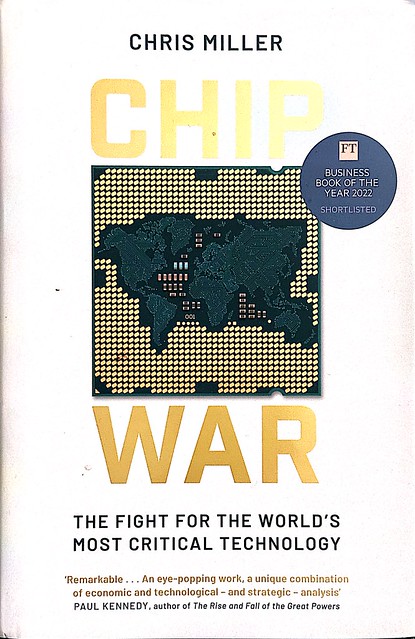3 minutes estimated reading time
It has taken me far too long to finish Chip War and write this review, so apologies in advance. Chip War was one of the FT’s best business books of 2022. In reality it’s a book about history, that happens to feature businesses.
The lens shaping everything else that I have written here
I am a sucker for books on the history of technology and Chip War was right in my wheelhouse. It complemented, rather than overlapped some of my existing favourite technology history books like Bob Cringely’s Accidental Empires, John Markoff’s What The Dormouse Said or most of Michael Malone and Steven Levy’s output to date.
The author
The author Chris Miller wasn’t a familiar name to me. Unlike Cringely, Markoff, Malone or Levy; Miller is an academic rather than a former journalist. Miller currently teaches international history at Tufts University. Chip War wasn’t his first book, his previous ones have focused on Soviet and Russian history. As a technology sector outsider, Miller’s Chip War has a very different tone my other favourite books from the genre.
It also allowed Miller to view the history of semiconductors in terms of a global perspective, that I hadn’t previously seen done.
On to Chip War itself
Other reviewers have used words like ‘outstanding’ and ‘epic’ to describe the book – which while being a reasonable guide to overall quality and length of read aren’t really all that helpful. It took me six months to read as a casual book. This is partly down to a hectic work schedule and that its a long book. I suspect that some readers when they reviewed the book seem to have thought ‘long’ as difficult to read. It’s actually 351 pages ignoring acknowledgements and the footnotes at the back of the book. Being an academic Miller worked hard to source everything in Chip War.
The book starts in the post-war period as the defence industry moves from being focused on hammering steel to developing smarter systems using semiconductors. That road takes the book past Texas Instruments and the early Silicon Valley of Bob Noyce and other members of the treacherous eight.
The book also zooms out to cover the Soviet Union’s failed efforts to replicate Silicon Valley as well as domestic industrial espionage and the start of globalisation which begat the current industry.
The Japanese challenge is covered in depth as is the rise of Korea including challenges that the industry faced in the early 2000s. The rise of Taiwan and its use of semiconductors as a hedge against invasion from the mainland. European tool maker ASML gets its own section, which is a case study in how to make a virtue of necessity. Finally it covers the technology conflict with China. Bring this up to date circa 2022.
If you are student of Silicon Valley history, then Chip War is unique in the way it puts everything in context. There were some completely new parts to me such as the political role that Sony founder Akio Morita played in advocating for a robust Japanese semiconductor industry as part of reasserting Japanese importance internationally.
